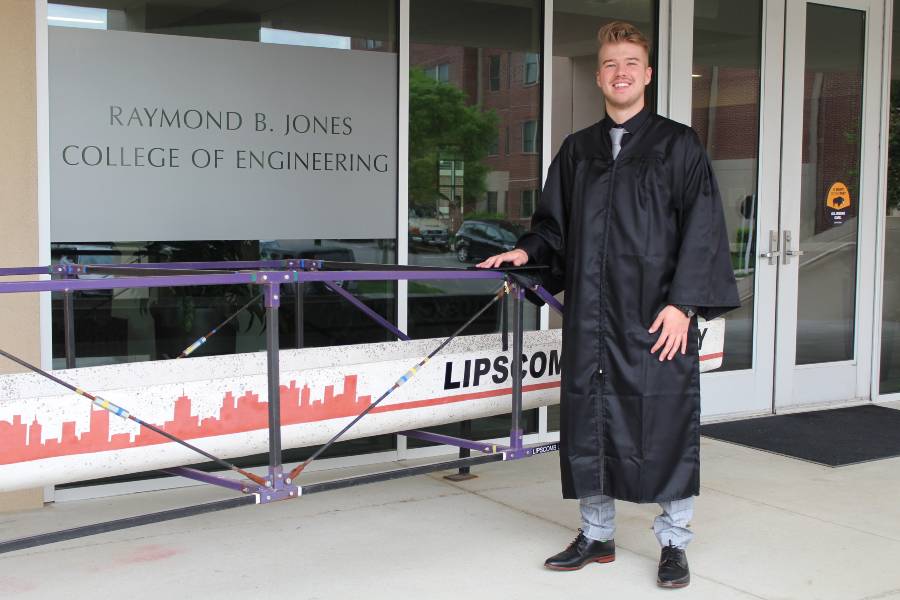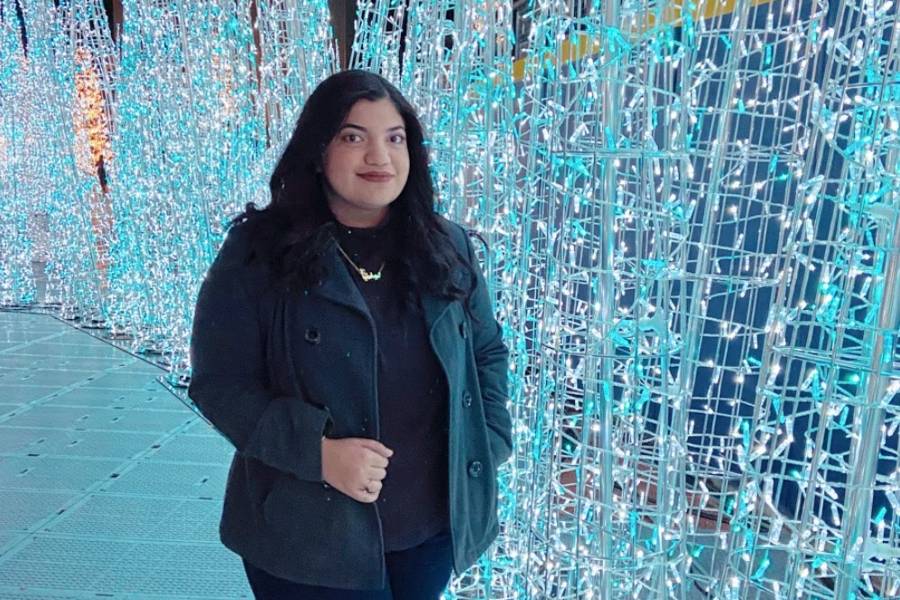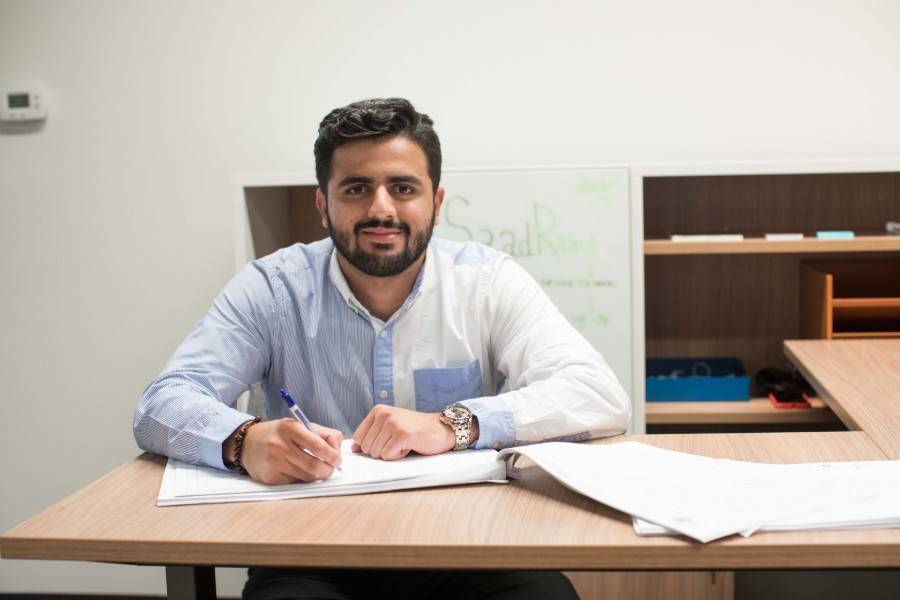From the graduation files: Engineering career dreams about to come true for trio of Overton Engineering Academy alumni
Kim Chaudoin |

Alen Zecic
When Meadya Doski, Saad Rajput and Alen Zecic receive their Bachelor of Science degrees on Friday, May 7, during commencement for the Raymond B. Jones College of Engineering it will be the culmination of a journey that began in high school.
The trio are graduates of Metro Nashville Public Schools’ John Overton High School, where they studied in the Engineering Academy. MNPS’s Academies of Nashville provides students with college and career prep experiences, offering a practical, hands-on approach to learning in fields that interest them ranging from engineering to healthcare.
Now, with an undergraduate degree in engineering complete, Doski, Rajput and Zecic are ready to put into practice the knowledge they have been honing for years.
Zecic says his experience at Overton solidified his desire to become an engineer.
“In the engineering academy, we had classes specifically tailored to engineering so this way I was exposed to multiple different types of engineering as well as I got to work on a variety of engineering projects. While attending class we would be tasked with scenarios that challenged the class to put together a solution for the given problem,” he recalls. “I will always remember the one scenario where we were tasked to design and build a bridge from balsa wood. The objective of this activity was to design a bridge that can tolerate the most amount of weight without collapsing. Activities like designing a bridge required critical thinking, modeling, and working together as a team. Since then, I realized that is what I love to do. So, I came to the conclusion that engineering is the right choice for me.”
He credits his Overton Engineering Academy teachers Steven Heileman and Sally Spear with having a tremendous impact on his dream of becoming an engineer by encouraging him, answering questions and allaying his doubts. Spear encouraged him to seek an ABET accredited engineering program if he wanted to one day be a certified engineer.
“So that is the route I took which brought me to Lipscomb as well. She was the one that introduced me to Lipscomb and then I signed up last minute and went with it,” says Zecic, a civil engineering major. “Now, I will be graduating in a couple of days, so I firmly believe everything happens for a reason.”
He calls his experience at Lipscomb amazing and a place where he made friends and connections that he will never forget.

Meadya Doski
“Lipscomb University’s engineering program is amazing. The faculty and staff of Raymond B. Jones College of Engineering always carries a positive attitude towards its students. Their goal is to encourage us and push us to get out of our comfort zone and achieve things that we as students often hesitate,” Zecic says. “Holding high standards, pushing their students to their maximum potential and holding the engineering ABET curriculum to the highest of standards is the reason why Lipscomb's engineering program produces so many great engineers every year.”
“The faculty will do whatever it takes to get you where you want to be, you just have to ask and be able to do what is asked of you. Overall, it is an amazing program with amazing people that produces amazing engineers,” he continues. “If I had the opportunity to redo my decision, I would not change anything, aside from some potential bad exam grades but at the end of the day, I would still choose to be a student of the engineering program. I thank them for everything they have done for me and for getting me to where I am now. I greatly appreciate the opportunity and will never stop saying thank you to them.”
Following graduation, Zecic will begin a job as a design engineer.
Doski says that even though she began her engineering studies while in high school, she is constantly learning new things about engineering. With strengths in math and science, Doski says Overton’s Engineering Academy gave her a good “baseline” of what engineering is generally, and then she discovered from there what specifically she wanted to study. She says she pursued civil engineering because she is “intrigued” by its real-world application.
Lipscomb University was the place Doski turned to continue her civil engineering studies.
“Lipscomb was a good fit for me. I like the size, and the professors have personal relationships with the students,” she says. “The classes are smaller in size so you’re able to build strong relationships with students … and you build relationships with everyone in the college itself. That alone means so much to me.”
“I've been very surprised by my experience at Lipscomb. I didn't come in looking for strong relationships with my peers and with professors,” she admits. “But the support I have received and the focus on community here has helped me so much getting through these four years.”
Doski and fellow graduate Rajput had a unique opportunity the summer of their junior year at Lipscomb to serve as interns at the Nashville office of Stantec, a global design and delivery firm with offices around the world. The internship was an opportunity for Rajput and Doski to put their engineering knowledge to work in a real-world setting.
Although Doski has completed other internships while at Lipscomb, the opportunity at Stantec stood out because of her interest in putting her civil engineering skills to work in the environmental engineering world.

Saad Rajput
“This was a perfect way to dive into this field and to build on my previous experiences,” she recalls. “Through the internship I was able to see how my classes are equipping me with the knowledge that I will use on the job.”
Rajput remembers that from a young age he was intrigued by knowing how things work. At age four, he sat in an airplane for the first time. He was fascinated by how the plane worked, particularly how it took off and landed.
“I didn’t know what engineering was at that age,” he says, “but I did want to know why my toy car wasn’t working and how I could fix it.”
When Rajput reached high school age and learned about Overton’s Engineering Academy, he knew it was a program made just for him. As a high school sophomore he took his first engineering class. In this class, Rajput built a race car, a rocket and a bridge.
“After I took that class I thought, ‘Yep, this is something that I’ve been thinking about since about middle school,’” he admits.
By his junior year, Rajput was learning autocad and job shadowing other engineers. He chose mechanical engineering because of the breadth of the discipline which would allow him to pursue careers in a variety of fields. Although Rajput’s mind was opened to the wonder of engineering at the Overton Academy, he said being successful also requires a personal commitment.
“I am a firm believer that it’s not what the institution has to offer you. It’s about what you want to get out of the institution,” he says. “It’s about how much you want to get involved.”
Rajput’s journey to the Raymond B. Jones College of Engineering began at Middle Tennessee State University in Murfreesboro. He soon learned that that institution’s engineering programs are not ABET accredited programs and began to search for a university in the area whose programs were so that he could transfer. All of Lipscomb’s engineering programs — civil, electrical and computing, and mechanical — are accredited by the Engineering Accreditation Commission of ABET.
After touring another Nashville-area university, Rajput visited Lipscomb. He knew immediately it was the place for him. He transferred the spring semester of his freshman year.
“I came to Lipscomb and it just felt right. I think it was God’s plan,” he says. “At first it was a little different for me because I started somewhere else and came to a place where I didn’t know anyone. My first semester I was just that kid who came to class and then just walked to the parking lot and went home every day. In high school, I was the guy who always wanted to get involved. But I wasn’t doing that when I first transferred.”
“Then, I realized that it’s what you make of it,” says Rajput. “I didn’t want to look back ten years down the road and the only memories I had was just going to class and going home.”
For more information about the Raymond B. Jones College of Engineering, visit www.lipscomb.edu/engineering.